Lee de-Wit
@leede-wit.bsky.social
Associate Professor in Political Psychologist at the University of Cambridge and Fellow at Trinity Hall. Deputy Head of the Department of Psychology, and Head of Undergraduate Education.
Reposted by Lee de-Wit
In a new paper in Cognition w. @davidyoung-psych.bsky.social and @leede-wit.bsky.social, we explore perceived dependencies as a possible cause for issue polarisation.
We show that this is possible experimentally where high dependency depresses updating.
www.sciencedirect.com/science/arti...
We show that this is possible experimentally where high dependency depresses updating.
www.sciencedirect.com/science/arti...
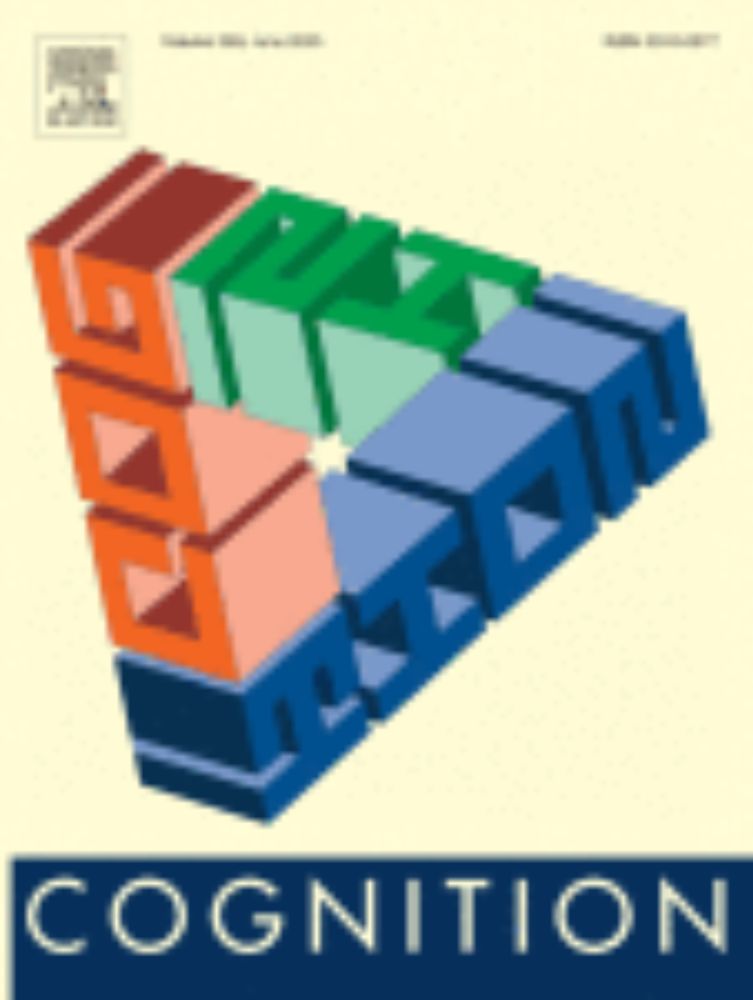
Belief polarization can be caused by disagreements over source independence: Computational modelling, experimental evidence, and applicability to real-world politics
A large literature debates whether belief polarization, in both experiments and real-world political opinion data, is the result of biased forms of re…
www.sciencedirect.com
April 8, 2025 at 11:42 AM
In a new paper in Cognition w. @davidyoung-psych.bsky.social and @leede-wit.bsky.social, we explore perceived dependencies as a possible cause for issue polarisation.
We show that this is possible experimentally where high dependency depresses updating.
www.sciencedirect.com/science/arti...
We show that this is possible experimentally where high dependency depresses updating.
www.sciencedirect.com/science/arti...
Reposted by Lee de-Wit
First time on Blue Sky! Super happy this article is now out in an issue of Political Psychology! And honoured by the promo tweet with custom-made graphic! @leede-wit.bsky.social
New research by David Young and Lee de-Wit gives us a deeper look at polarization within political parties. Their findings suggest factional divides within a party can be as strong, and even stronger, than those between parties. Read more: https://doi.org/10.1111/pops.12973
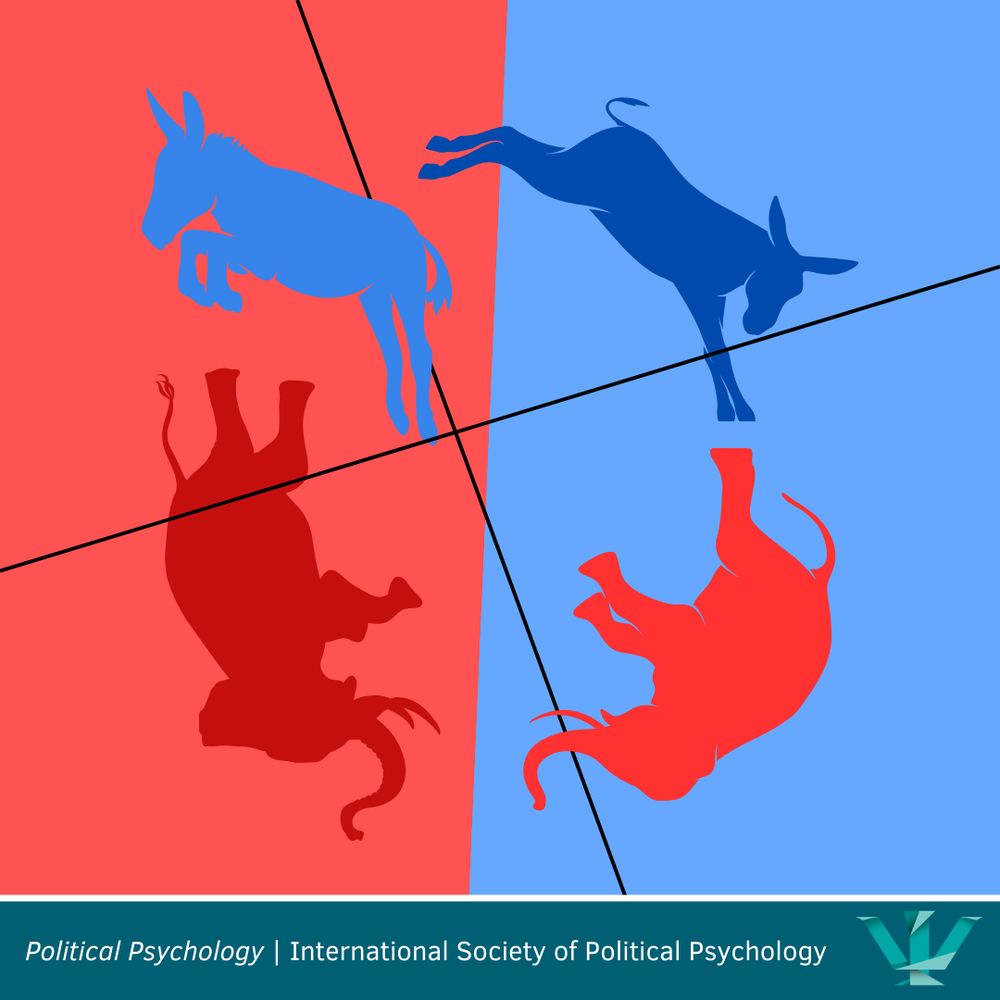
March 17, 2025 at 6:44 PM
First time on Blue Sky! Super happy this article is now out in an issue of Political Psychology! And honoured by the promo tweet with custom-made graphic! @leede-wit.bsky.social
Reposted by Lee de-Wit
Last year, we published a paper showing that AI models can "debunk" conspiracy theories via personalized conversations. That paper raised a major question: WHY are the human<>AI convos so effective? In a new working paper, we have some answers.
TLDR: facts
osf.io/preprints/ps...
TLDR: facts
osf.io/preprints/ps...
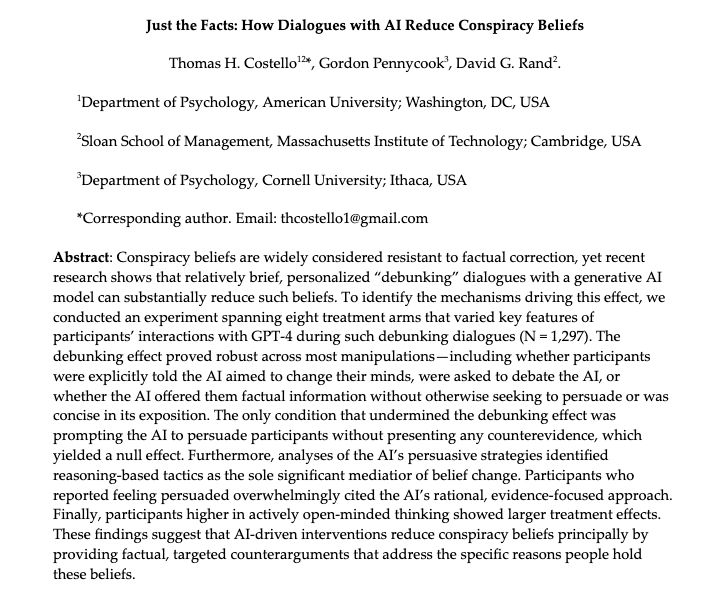
February 18, 2025 at 4:30 PM
Last year, we published a paper showing that AI models can "debunk" conspiracy theories via personalized conversations. That paper raised a major question: WHY are the human<>AI convos so effective? In a new working paper, we have some answers.
TLDR: facts
osf.io/preprints/ps...
TLDR: facts
osf.io/preprints/ps...
Reposted by Lee de-Wit
Excited to share that our BBS target article — "Children as agents of cultural adaptation" — is online & open for commentary! In it, @sheinalew.bsky.social & I argue that children's peer cultures might play an important & understudied role in cultural adaptation.
www.cambridge.org/core/journal...
www.cambridge.org/core/journal...

January 2, 2025 at 3:11 PM
Excited to share that our BBS target article — "Children as agents of cultural adaptation" — is online & open for commentary! In it, @sheinalew.bsky.social & I argue that children's peer cultures might play an important & understudied role in cultural adaptation.
www.cambridge.org/core/journal...
www.cambridge.org/core/journal...
Reposted by Lee de-Wit
Over the 2020 US and NZ elections, antidemocratic attitudes preceded conspiracy beliefs, rather than conspiracy beliefs fostering antidemocratic attitudes
by @lindaskitka.bsky.social & many others in @ispp-pops.bsky.social #socpsych #polisky #polpsych
onlinelibrary.wiley.com/doi/full/10....
by @lindaskitka.bsky.social & many others in @ispp-pops.bsky.social #socpsych #polisky #polpsych
onlinelibrary.wiley.com/doi/full/10....



January 23, 2025 at 2:38 PM
Over the 2020 US and NZ elections, antidemocratic attitudes preceded conspiracy beliefs, rather than conspiracy beliefs fostering antidemocratic attitudes
by @lindaskitka.bsky.social & many others in @ispp-pops.bsky.social #socpsych #polisky #polpsych
onlinelibrary.wiley.com/doi/full/10....
by @lindaskitka.bsky.social & many others in @ispp-pops.bsky.social #socpsych #polisky #polpsych
onlinelibrary.wiley.com/doi/full/10....
Reposted by Lee de-Wit
(1/8) I’m very excited to share this new publication in Public Understanding of Science. Citizens’ trust in science increasingly depends on their political leaning. In a theoretical article published in 2021, I proposed a four-level model for this ‘science polarization.'
doi.org/10.1177/0963...
doi.org/10.1177/0963...
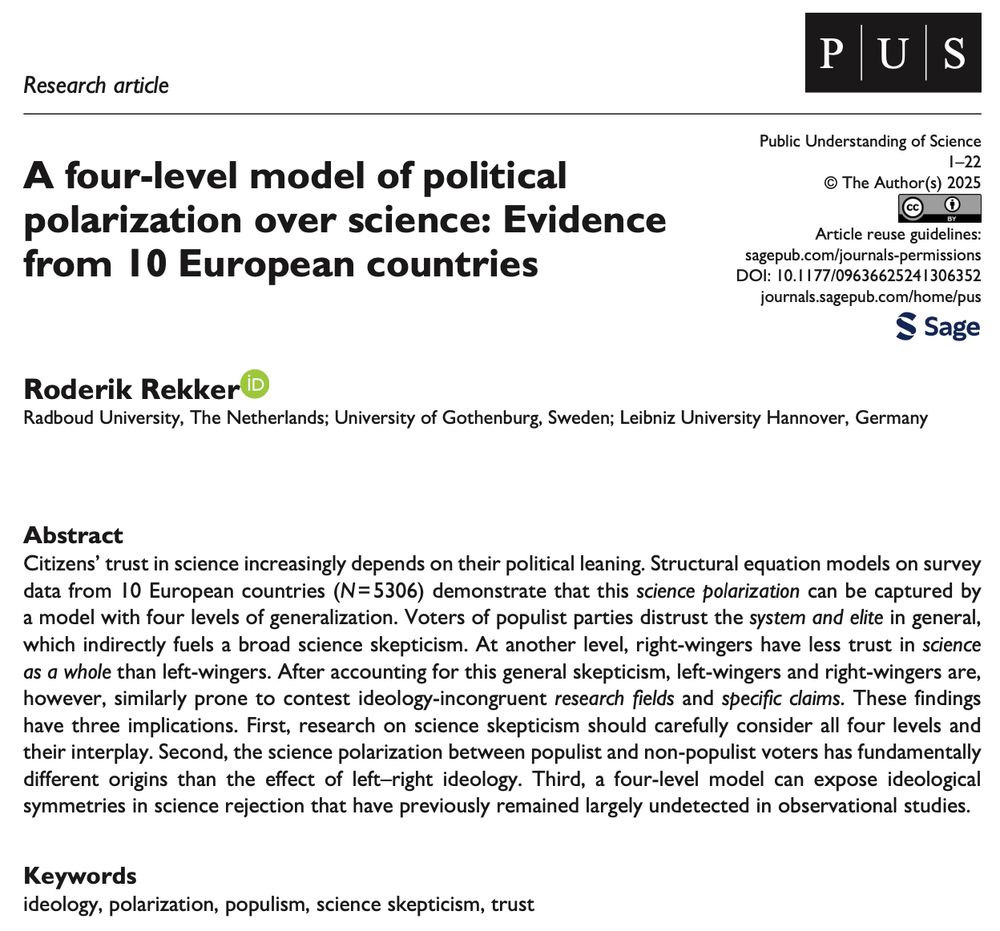
January 18, 2025 at 11:04 AM
(1/8) I’m very excited to share this new publication in Public Understanding of Science. Citizens’ trust in science increasingly depends on their political leaning. In a theoretical article published in 2021, I proposed a four-level model for this ‘science polarization.'
doi.org/10.1177/0963...
doi.org/10.1177/0963...
Reposted by Lee de-Wit
We often define the ideological space in terms of the economic and cultural dimensions; how does this resonate with ordinary citizens? This is the question Thomas and I explore in a new Element, analyzing answers to open-ended survey questions 🧵
cup.org/4gEYCOj
cup.org/4gEYCOj
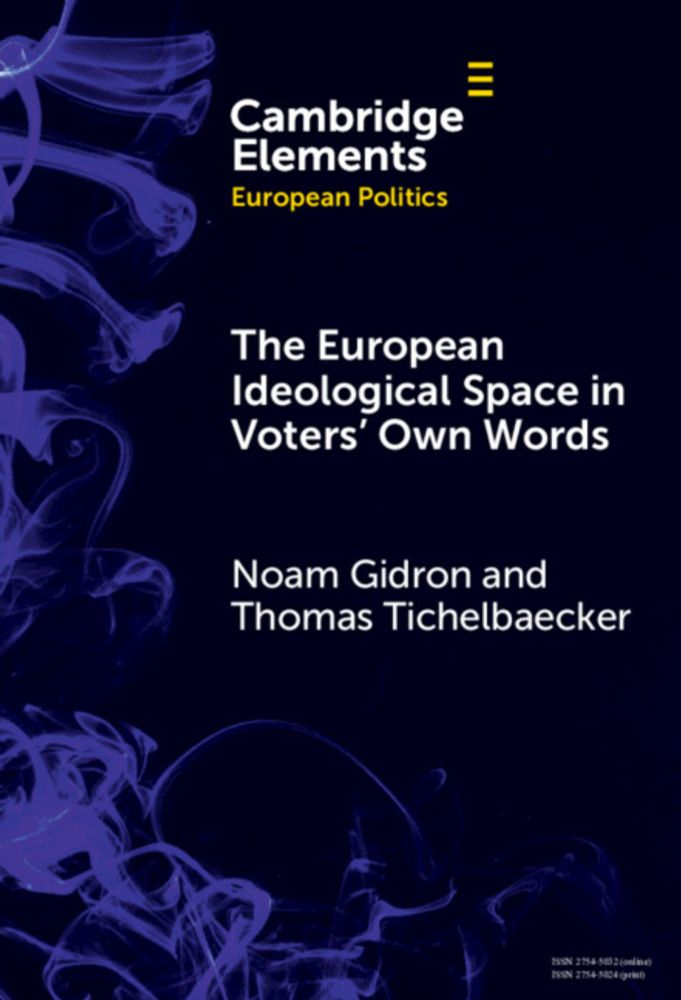
The European Ideological Space in Voters' Own Words
Cambridge Core - Organisation Studies - The European Ideological Space in Voters' Own Words
cup.org
January 7, 2025 at 4:45 PM
We often define the ideological space in terms of the economic and cultural dimensions; how does this resonate with ordinary citizens? This is the question Thomas and I explore in a new Element, analyzing answers to open-ended survey questions 🧵
cup.org/4gEYCOj
cup.org/4gEYCOj
Reposted by Lee de-Wit
No evidence for inequity aversion in non-human animals: a #meta-analysis of accept/reject paradigms
royalsocietypublishing.org/doi/10.1098/...
New paper led by Oded Ritov and w/ @nicholaraihani.bsky.social and Jan Engelmann.
royalsocietypublishing.org/doi/10.1098/...
New paper led by Oded Ritov and w/ @nicholaraihani.bsky.social and Jan Engelmann.

No evidence for inequity aversion in non-human animals: a meta-analysis of accept/reject paradigms | Proceedings of the Royal Society B: Biological Sciences
Disadvantageous inequity aversion (IA), a negative response to receiving less than
others, is a key building block of the human sense of fairness. While some theorize
that IA is shared by species acro...
royalsocietypublishing.org
November 27, 2024 at 4:39 PM
No evidence for inequity aversion in non-human animals: a #meta-analysis of accept/reject paradigms
royalsocietypublishing.org/doi/10.1098/...
New paper led by Oded Ritov and w/ @nicholaraihani.bsky.social and Jan Engelmann.
royalsocietypublishing.org/doi/10.1098/...
New paper led by Oded Ritov and w/ @nicholaraihani.bsky.social and Jan Engelmann.
Reposted by Lee de-Wit
Now published in PNAS! We had a survey in the field at the time of the first assassination attempt on Trump. We found that Rs became significantly less supportive of partisan violence and had increased in-party affect.
www.pnas.org/doi/10.1073/...
www.pnas.org/doi/10.1073/...

November 26, 2024 at 7:22 PM
Now published in PNAS! We had a survey in the field at the time of the first assassination attempt on Trump. We found that Rs became significantly less supportive of partisan violence and had increased in-party affect.
www.pnas.org/doi/10.1073/...
www.pnas.org/doi/10.1073/...
Reposted by Lee de-Wit
What attributes of a government lead citizens to view it as trustworthy? Our article - led by @danjdevine.bsky.social - is out in EJPR today... Competence, benevolence and integrity all matter - but perceived benevolence matters most. ejpr.onlinelibrary.wiley.com/doi/10.1111/...

November 21, 2024 at 10:19 AM
What attributes of a government lead citizens to view it as trustworthy? Our article - led by @danjdevine.bsky.social - is out in EJPR today... Competence, benevolence and integrity all matter - but perceived benevolence matters most. ejpr.onlinelibrary.wiley.com/doi/10.1111/...
Reposted by Lee de-Wit
In January @lizsuhay.bsky.social & I will be co-EiC at Political Psychology. We will be the first EiC team that represents both of the key disciplines of this interdisciplinary journal.
November 18, 2024 at 5:17 PM
In January @lizsuhay.bsky.social & I will be co-EiC at Political Psychology. We will be the first EiC team that represents both of the key disciplines of this interdisciplinary journal.

